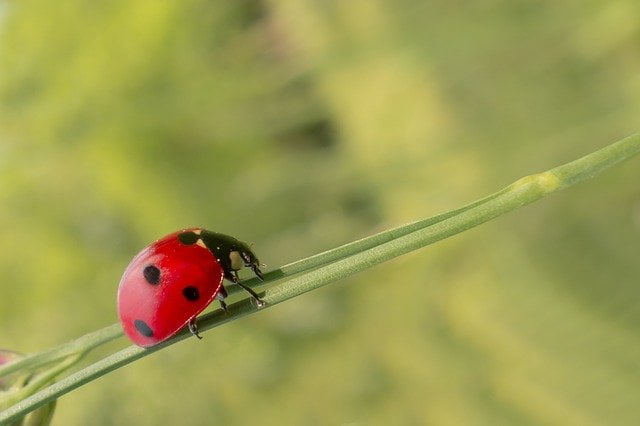To pest-proof your garden, start with regular plant inspections using a magnifying glass to catch early signs like discoloration or wilting. Employ companion planting by placing basil near tomatoes to repel aphids and marigolds to deter nematodes. Attract beneficial insects with pollinator plants and insect hotels. Create homemade deterrents using essential oils or vinegar sprays. Implement physical barriers like fine-mesh fencing or copper tape to keep pests at bay. Maintain healthy soil with organic compost and regular soil testing. Encourage natural predators by installing birdhouses and insect hotels. Dive deeper to master these techniques for a pest-free garden.
Inspect Your Plants Regularly
Regularly inspecting your plants is fundamental for maintaining a pest-free garden. By closely examining leaves, stems, and soil, you can quickly identify early signs of plant diseases and pests.
Use a magnifying glass to spot tiny insects and fungal spores. Prompt response to pest identification inquiries can be highly beneficial at this stage. Pay attention to discoloration, wilting, or unusual growth patterns, as these can indicate underlying issues.
Pest identification is essential; knowing whether you’re dealing with aphids, spider mites, or fungal infections allows for targeted treatments. Swift action prevents minor problems from escalating into full-blown infestations.
Don’t just look at the surface; check the undersides of leaves and around the plant base. Through regular inspections, you guarantee your garden remains a haven of health and robustness, free from destructive intruders.
Use Companion Planting
Companion planting stands as an essential strategy in your pest-proofing arsenal. By interspersing strategic herb combinations and flower companions, you can naturally deter pests.
For instance, planting basil near tomatoes repels aphids and tomato hornworms, while marigolds, when placed alongside vegetables, exude a scent that keeps nematodes at bay.
Consider integrating herbs like rosemary and thyme; their potent oils can ward off a variety of insects. Additionally, nasturtiums act as a trap crop, drawing aphids away from your prized produce.
By cultivating these symbiotic relationships, you create a dynamic, self-sustaining garden ecosystem. This method not only limits chemical use but also enhances biodiversity, ensuring your garden thrives with minimal intervention.
For more serious pest issues, consult Illawarra Pest Control for expert advice and quotes.
Attract Beneficial Insects
Drawing beneficial insects to your garden can greatly bolster your pest control efforts. Start by planting pollinator plants like milkweed, lavender, and sunflowers, which attract natural predators of common garden pests. These plants provide nectar and pollen, essential for bees, ladybugs, and lacewings.
Create insect hotels to offer shelter and breeding grounds for these beneficial insects. Position these structures in shaded, undisturbed areas of your garden.
By fostering a habitat for beneficial insects, you enhance ecological balance and reduce the need for chemical pesticides. This method not only supports pest management but also promotes biodiversity, giving you the freedom to enjoy a thriving, sustainable garden.
Implementing these strategies guarantees a robust defense against unwanted pests.
Create Homemade Deterrents
To effectively deter pests naturally, crafting homemade deterrents can provide an eco-friendly and cost-efficient solution.
Start by using essential oils like peppermint, eucalyptus, or lavender, which act as potent insect repellents. Mix 10-15 drops of your chosen oil with water in a spray bottle for an easy-to-apply solution.
Another effective method is creating vinegar sprays. Combine equal parts of white vinegar and water, and add a few drops of dish soap to increase adhesion to plant leaves.
Spray this mixture directly on plants and garden borders to repel various pests.
These methods allow you to protect your garden without harmful chemicals, giving you the freedom to enjoy a thriving, healthy outdoor space.
Implement Physical Barriers
Physical barriers serve as an indispensable method for keeping pests out of your garden. Start with proper fence options: install fine-mesh or hardware cloth fencing around your perimeter. These materials are excellent at deterring small mammals and insects.
For elevated garden beds, consider using copper tape, which repels slugs and snails. Netting techniques are also highly effective; use insect netting to cover your plants, ensuring it’s tightly secured to prevent gaps where pests could enter.
Floating row covers work well for larger areas, protecting crops from flying insects. By combining these methods, you’ll create a fortress that keeps your garden thriving, ensuring your outdoor space remains an oasis of freedom and productivity.
Maintain Healthy Soil
Healthy soil is the cornerstone of a thriving garden, teeming with nutrients and beneficial microorganisms. To maintain this essentiality, incorporate soil amendments such as organic compost.
Compost enriches the soil, enhancing its structure, water retention, and aeration. You can create your own compost from kitchen scraps and yard waste, giving you control and reducing waste.
Regularly test your soil’s pH and nutrient levels to tailor amendments precisely. Adding organic matter boosts microbial activity, fostering a resilient ecosystem that deters pests naturally.
Mix compost thoroughly into the top layers of soil to guarantee even nutrient distribution. Healthy soil not only nurtures robust plants but also creates an inhospitable environment for many common garden pests.
Encourage Natural Predators
One of the most effective strategies for pest-proofing your garden is to encourage natural predators. To attract these beneficial allies, install bird houses to invite insect-eating birds like chickadees and wrens.
These avian hunters will patrol your garden, reducing pest populations without chemicals. Additionally, set up insect hotels to provide shelter for predatory insects such as ladybugs, lacewings, and solitary bees.
These insects target aphids, caterpillars, and other common garden pests. By supporting a diverse ecosystem, you create a self-regulating environment that minimizes the need for synthetic interventions.
This approach not only fosters a healthier garden but also grants you the freedom to enjoy a more sustainable and balanced outdoor space.
Conclusion
By following these pest-proofing strategies, you’ll transform your garden into a fortress of healthy plants. Regular inspections, companion planting, and attracting beneficial insects are your first line of defense. Homemade deterrents and physical barriers provide additional layers of security. Maintaining soil health and encouraging natural predators are like adding the cherry on top of a sundae. So, roll up your sleeves, and let’s get your garden ready to withstand any pest invasion, ensuring a bountiful harvest all season long!

















































































0